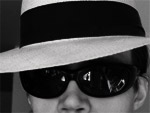Selfless Service: A Manifesto
Week of: Supplemental
Abstract: I expound on Acts of Service
Disclaimer: What follows is philosophy and contains no information about x-ray school or radiologic technology.
Elucidation: I want to see what I do during the day as more than the typical, “I punch in, I punch out for lunch, I punch in, I punch out and go home.” I want to see work as the pure expression of acceptance and offering of sharing and listening of giving and taking. Work is, in large part, what makes us human. It helps me to think of what I do during my shift as service.
I want to see the people I serve: patients, families, other staff, doctors – as the truest expression of what I aspire. I try to see them as wonderful contributions to humanity. I lend my best listening. I offer my heart of compassion. But I don't feel their pain. Instead, I open my eyes to their beauty and truth. I listen, through intuition, to the meaning behind their words. I've seen many people wracked with pain, beset with injury, but I always look for the unique aspect of the individual. And often I find that they have something to offer me even though I wasn't looking for it.
How do we bring the spirit of service to are lives? Methods will differ. For me, it always comes down to introspection. It comes down to several questions. How can I see this patient in their best light? How do I involve myself in a more deeply held involvement and commitment to Quality work? How can I learn to see my work as service?
Many of us will remember times when we gave selflessly. Mothers and Fathers do it everyday with their children. Selflessness refers to a removal of attachment to the fruits of our labors. When I get a paycheck I see it as a gift. I know full well that I worked very hard for the money. But I aways want to feel gratitude in my heart. It's possible to give generously with out spending a cent.
I remember one day I stood at one of the most busy intersections in which the city I live. An older man stood, leaning on this walker. “Sir, Will you be OK crossing the street,” I asked. His appearance was infirm. He indicated that he could cross with some difficulty but would like some assistance. I offered my arm to him and carried his walker. I told him to hold on. His grip was like iron. We walked at his pace: slow. The light changed before we had made it half-way across the four lanes. No drivers blew their horns or yelled as I feared they might. We crossed the street safely after some time.
On the other corner he smiled and with a bright presence in his eyes said, “You Sir are a gentleman and a scholar.” I know I could have left him in the dust. My purpose is to offer an illustration of how we can be unconditionally selfless in the way we approach action. Selflessness does not mean we loose a sense of self. Rather, we gain a sense of self. Each action that helps someone else can be an opportunity of selflessness. I believe seeing our daily occupation as service allows us to experience, as Abraham Lincoln said in a different context, “the better angels of our nature.” It's liberating. It also helps us avoid burn out; selfless service recharges our batteries. When we sustain it, the act of it sustains us.
Those of you who are still reading will ask, “Well fine, how does this apply to imaging technologists and the larger medical field.” I say, there's no finer field for it to be applied. As we well know, the people we see professionally are in many stages of life and health. Suffering runs across social and economic boundaries. How better to affirm then why many of us go into the medical field in the first place: to help people. And for that matter why limit it to patients. I try to say mentally, I offer this action to the individual I see before me. We all want to love what we do. Selflessly offering our actions in the form of service is one method of maintaining a high level of satisfaction and a love for our work.
I will never be able to say this as well as others more involved than I in the expression of selfless service. I have found this book helpful:
How Can I Help
Das and Gorman
Paperback: 256 pages
Publisher: Knopf (March 12, 1985)
Language: English
ISBN-10: 0394729471


5 Comments:
What a great post. I admire you for delving into this topic and pushing yourself to look at this line of work with such a positive perspective. I know I'm new at this, but I shadowed at enough hospitals and have been around enough "seasoned" techs to know that they should all be reading the book you suggested.
Here's to none of us "newbies" ever becoming jaded and seeing our line of work as anything but a wonderful gift and opportunity!
I think you have an outstanding attitude! If I ever need an x-ray exam you are exactly the type of person I would want caring for me. Keep it up, you will go far!
I added the book to my wishlist on amazon.com... thanks for the tip :)
Nice post. Somehow a copy of it ended up posted on the wall in the staff restroom. I'll never tell...
Thanks all.
@funny bones: that is so cool!
Post a Comment
<< Home